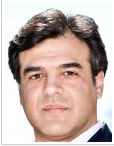
Phillip Louis Chance was convicted at the age of 15 and placed in an adult jail for his role in a robbery and murder by his cousin. Chance said he was bullied into making a confession and didn't know his cousin was going to rob and kill the store owner.
(Image by (photo: The Marshall Project)) Details DMCA
In 1971, a then-15-year-old Chance and his older brother left Detroit with family to visit a cousin in Choctaw, Alabama. During that visit, the three went to a convenience store, which the cousin proceeded to rob. The cousin then killed the clerk. Chance cooperated fully with the police and told them where his cousin had hidden the stolen money. Prosecutors, though, charged all three of the teens, who were black, with murdering the white clerk. Chance's defense attorney told him to plead guilty, saying that because he had cooperated with the cops that he would likely be sentenced to a year in the local jail. The judge, though, gave him life without parole. This was a 15-year-old who had not killed anybody.
Chance was sent to an adult prison, where he was so well-behaved that he was able to work his way down from maximum security to a minimum-security work-release program in only 10 years. But in 1981, despite never having had a single disciplinary infraction, he was denied parole. The parole board said specifically that he posed a "threat to the community." Frustrated, a few days later, Chance walked away from the work-release program and made his way back to his family in Detroit.
The State of Alabama pressed relentlessly for Chance's return. But the (Republican) governor of Michigan granted Chance asylum, and he and subsequent governors refused Alabama's repeated extradition requests. Several of the governors said that Chance had been railroaded and argued that he was a victim of racial discrimination and injustice.
But the State of Alabama would not relent. Then-State Attorney General Jefferson Beauregard (Jeff) Sessions filed a federal lawsuit against the State of Michigan demanding that Chance be extradited to serve the rest of his life term. Finally, in 1996, the federal Sixth Circuit Court of Appeals ordered the extradition. Chance was arrested and transported to Birmingham.
One federal appellate judge noted in dissent, "Mr. Chance will be returned to a jurisdiction and prison system with a wretched history and, even more distressing, a present demeanor violative of international standards on the treatment of all prisoners." The judge was referring to Alabama's decision to bring back the chain gang, as well as the practice of shackling prisoners for as long as seven hours to chest-high horizontal bars called "hitching posts." The judge continued that, "If South Africa can sign a new democratic constitution and Pakistan can take steps toward a ban on flogging, surely the State of Alabama, in the United States of America, can learn from its lamentable past and embrace modest principles of human rights." But it wasn't to be.
In 1999, three years after being returned to Alabama, Chance appeared before the parole board. Alabama Parole Board chairwoman Gladys Riddle and board member Johnny Johnson noted that Chance had been 15 years old at the time of his crime, that he was not the killer, and that he had led an exemplary life in Michigan. The board voted to grant him parole.
Alabama Attorney General Bill Pryor condemned the recommendation, and Governor Don Siegelman, a Democrat who would later be sentenced to seven years in a federal prison on what many believe to be trumped up political charges, called on the board to immediately reverse its decision. Siegelman asked rhetorically why the board would release a "convicted killer" after the state had spent more than $200,000 only three years earlier to have him extradited from Michigan. The board rescinded its decision and Chance remained in prison.
Chance came up for parole many times over the next two decades. He told the board each time about how he had maintained an exemplary disciplinary record, how he had earned a GED and a college degree in theology while incarcerated, and about how he had developed life-threatening health problems in prison. Indeed, during those years he developed kidney and heart disease, had two heart attacks, underwent quadruple bypass surgery, developed diabetes, and had a stroke. His application for compassionate release was denied. He finally died in November, chained to a hospital bed.
Phillip Chance is just one man. His is just one case. But it is an example of everything that is wrong with the American judicial system. It's not a system that seeks or pursues justice. It's a system that seeks punishment. There is no rehabilitation. There is no compassion. There's just punishment. And even then, we're backsliding.
Jeff Sessions is now Attorney General of the United States. It is he who sets policy on prosecutions, on prison reform, and on sentencing reform. Advocates of these reforms and of easing mandatory minimum sentencing made huge strides under the Obama administration. And that wasn't easy. Obama eventually came around, but for years he was no friend of reformers. Now there's almost nothing to look forward to. What we can expect, though, at least for the next four years, is to hear more stories like that of Phillip Chance.
Reader Supported News is the Publication of Origin for this work. Permission to republish is freely granted with credit and a link back to Reader Supported News.





